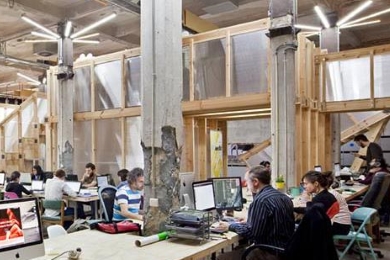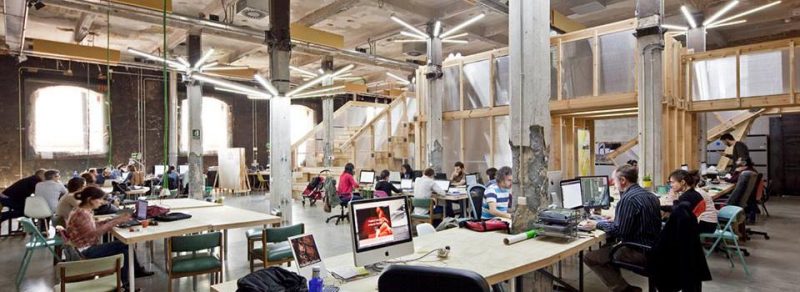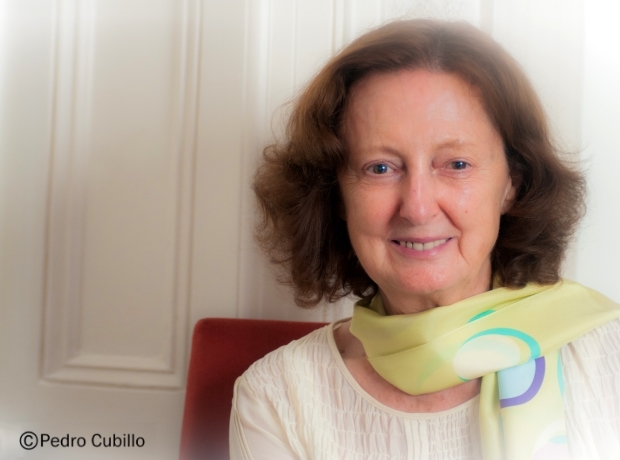25 Jul 2016
Factoria Cultural | Interview with Rosina GOMEZ-BAEZA


As part of the series By People/In Cities, ASEF culture360 contributor David FERNÁNDEZ interviews Rosina GOMEZ-BAEZA, President of Factoría Cultural (Matadero), a creative incubator and hub promoting the development of entrepreneurial initiatives in the various fields of technology, communication and the arts.

David FERNÁNDEZ: What motivated you to start Factoría Cultural?
I conceived the idea of setting up a creative hub when I directed LABoral, the Art and Creative Industries Centre I founded, with the support of the Asturias Self-Governing Body. At LABoral the creative sector´s professionals connected, stimulating new thinking and innovation. An ITC Inno Lab and a Fab Lab were set up. Numerous projects were developed but I was not aware then of the importance of offering the creative sector support for capacity building in order to enhance the chance of success as a creative business.
DF: What did you set out to achieve when you founded Factoría Cultural? How did this idea shape and how did you make it possible?
About 20% of Spain´s population is out of work. I yearned to do my bit to relieve this huge problem. Creative hubs help drive the economy by connecting the creative sector’s professionals, projects and ideas to each other, and to other sectors where they innovate, stimulate new thinking, and generate high-value and highly skilled jobs. When I left LABoral to return to Madrid, I decided to present the Factoría Cultural Creative Hub project to the City Council. They took an immediate interest in my programme.
DF: How have your aims/expectations change since you founded Factoría Cultural?
Factoría provides a suitable working space, that is to give residents practical advice and tools to build their creative business. That is our magical formula from day one and our common objective is to connect and develop opportunities for a community of creatives. I believe that Factoría is a solid foundation but we know that Factoría must be service-oriented and that our team has to listen carefully to residents´ needs and requirements. On the alert, always!
DF: How is the public in Madrid reacting to this creative hub and its developments?
The Cultural and Creative Industries provide invaluable social cement so we try to create understanding and awareness of the value of the diverse disciplines and how they can benefit the local community. We channel information through social media, the organization of workshops for adults and children and other events such as a series of lectures for the general public called ‘Programa Experto’. On Thursday evenings creative professionals in every field present their success stories. Yet, we still have to realize in this country that culture is one of Spain’s great hopes, of Europe’s great hopes even.
[gallery ids="59590,59589,59588,59587,59586,59585,59584"]
DF: While developing Factoría Cultural, have you recently encountered any creative / collective or project that you felt strongly about?
Factoría now houses sixty projects and over a hundred creative professionals. I am truly delighted at the diversity of the projects which range from technology, video games, theatre, music, books, architecture, fashion, visual arts, design and advertising and communications…
DF: What are the most important focus points of your creative platform?
Boosting creativity and innovation is essential to our programme. An emphasis is put on digital uses, education and networking so as to enable all creative sectors to develop. Incentivising creative entrepreneurs is vital to Factoría.
DF: What are your plans for the future of Factoría Cultural, do you have any specific goals you would like to attain in the future?
We are now working on the development and streamlining of our know-how, our culture, so that it can be shared by other cities in Spain. We aspire to pitch in to the dynamism of this fast-growing sector in Spain, which contributes significantly to youth employment. The creative and cultural industries account for 4.2% of the GDP of the European Union and 3.4% in Spain. The annual revenue is 535.9€ billion and more than 7 million workers (December 2014).
DF: What would you say has been the biggest thing that the development of Factoría Cultural have taught you about the local creative arena?
The creative sector in Madrid was largely untapped. We aspire to reinforce this sector. The importance and potential to create jobs and fuel economic growth has been largely proved and we are committed to championing creative talent and providing a nurturing environment.
DF: Have you ever participated into any European projects with other creative spaces? Have you done any collaboration also out of Europe?
We are part of the Creative Hubs Network (ECHN) a consortium of six European creative hubs which has been recently set up. This working group is led and coordinated by the British Council. It will act as a dynamic platform for sharing insights, tools and resources that empower managers and support the resilience of creative hubs.
Unfortunately we have not as yet established any sort of collaboration outside Europe.
DF: What is Madrid cultural scene like nowadays? How would you describe Madrid and its creative community?
It is certainly building partnerships and working in collaboration with organizations, funders, local government and academia. Factoría provides a vital new addition to its creative economy infrastructure.
___
Links:
LABoral: http://www.laboralcentrodearte.org/en
Factoría Cultural Creative Hub: http://factoriaculturalmadrid.es/en/
Creative Hubs Network (ECHN): http://creativeconomy.britishcouncil.org/blog/16/02/24/european-creative-hubs-network-innovative-models-s/
___
David FERNÁNDEZ is a Spanish-born contributing writer based in Bangkok, Thailand. Currently working as freelance arts & cultural project manager and digital media consultant, he is also one of the co-founders of Cho Why multi-disciplinary project space. He previously co-founded Le Cool Bangkok arts & culture webzine and worked as content director. Formerly, he served as cultural attaché at the Embassy of Spain – Cultural Office in Bangkok.
Similar content
posted on
20 Apr 2017
posted on
14 May 2018
posted on
09 Feb 2017
posted on
21 Aug 2018
posted on
03 Feb 2017
posted on
18 Dec 2017





